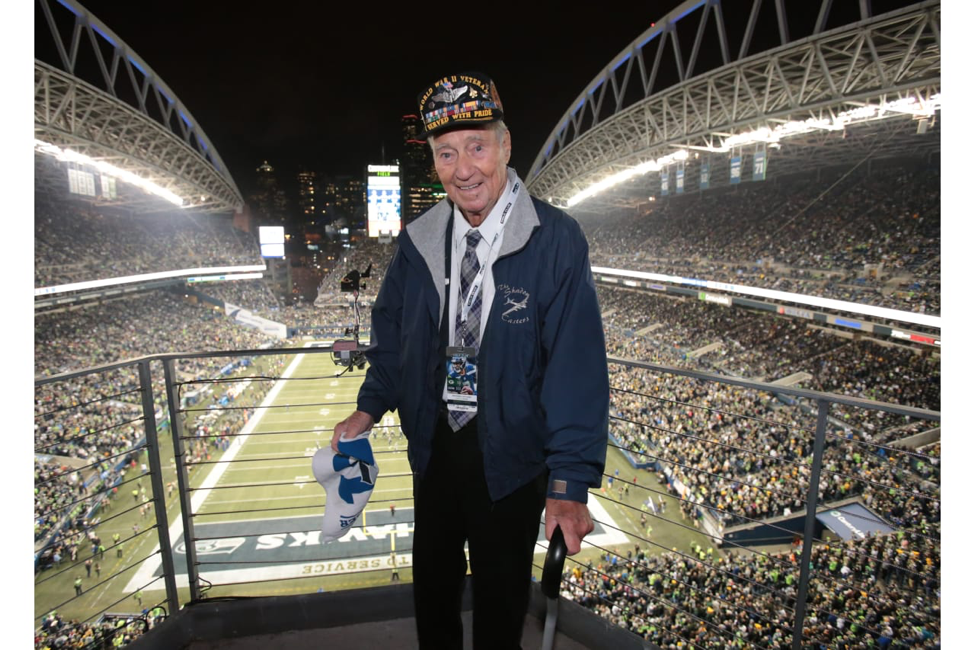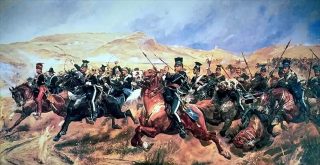At the age of twenty, Art Unruh flew 50 missions into enemy territory in the European theater of World War II. The first six missions he served as a tail gunner on a B-17 Flying Fortress. Protecting the B-17 from all threats behind the plane was a dangerous assignment, but it wasn’t the most dangerous – that belonged to the waist gunners. The waist gunner had to stand, which exposed them to more enemy fire. For the next 46 missions, Army Staff Sgt. Art Unruh served as a waste gunner, and miraculously he returned safely from each one.
To deal with the stress, Uruh and his fellow airmen took it one day at a time, focusing on the task at hand:
“You’d go out in the morning, you’d say, ‘Uncle Sam, here is my life,’ you’d go up and do your mission, you’d come back and he gives it back to you. Next day you go out — ‘here’s my life again.’ And you just would be very fortunate if you don’t get hit.”
The sense of gratitude that got Unruh through each day of the war is still with him today, at 96 years of age. He still feels gratitude for each day. One of his rules to live by (the other 3 rules are listed at the bottom of the article):
“Take real good care of today because today is all that you’ve got. Yesterday’s gone and it never will be here again. Tomorrow’s not here yet and it might not ever get here. You just take care of today and everything is going to be fine.”
During World War II, Unruh enlisted because of a sense of duty and a deep love for his country. On the back of his veteran’s hat is the motto: “Served with pride.” Yet, as he looks around at society today, he doesn’t see that same belief and pride in the United States:
“That’s what we need in this country today, we need more pride,” he said. “Back in those days, it was ‘we’ and ‘us,’ and now it’s ‘I,’ ‘me’ and ‘my’ over here. Things have changed so drastically.”
Unruh is sending a message to the next generation. It is our responsibility to carry the torch that his generation passed on. The gift of freedom we received was only possible because so many like Unruh sacrificed and suffered. We’ll never live up to the noble ideals of our country by only pursuing our narrow personal interests. True leadership requires that we find ways to serve others.
Unruh’s advice reminds me of Muhammad Ali’s Commencement address to the Harvard class of 1975. George Plimpton, the writer, was in the audience:
“[Muhammad Ali] gave this wonderful speech about how he hadn’t had the opportunity, but [the students] had, and they should use that language, that learning to go out and change the world and make it a better place. And it was moving and it was funny at the same time and there was a great roar of appreciation at the end of it. And then someone at the end of it shouted out ‘Give us a poem!’, and everybody quieted down.”
Ali’s spontaneous response was “Me, We.” Plimpton calls it the shortest poem in the English language. It might also reveal the most powerful truth. I interpret it as saying, yes, we all have our own lives and personal identities; but ultimately, what matters most in life is the “we.” We derive meaning in our lives through the relationships, the community, and the transcendent experiences of connecting with something bigger than our self.
All great accomplishments are really about “we.” Consider a baseball team winning a World Championship. Bill James, the famous baseball analyst and statistician, was for years the ultimate outsider in professional baseball. He worked independently analyzing player performance and statistics and in 1977 he began publishing his annual “Bill James Baseball Abstract.” The Abstract quickly became the Bible of baseball statistics, and Bill James became the world expert on what it takes to assemble a winning baseball team.
In 2003 James was hired by the Boston Red Sox and he became a baseball insider. He was invited beyond the world of statistics and into the clubhouse and the front-office of a major league baseball team. James was asked what surprised him most about his move from outsider to insider, and this was his response:
“The most surprising thing was an understanding of how many people contribute to a championship. And it literally is impossible to explain to an outsider how many people it requires doing how many different jobs at a high level in order for a baseball team to win a World Championship. And, the number of streams – the number of little streams that feed into that river – it’s almost incalculable. Consider Dustin Pedroia – you have to look at everybody who had a big influence on Pedroia, which may include your Minor League managers, your Minor League coaches; it may include the scouts – the first scout who focused on him and the other scouts who focused on him. But it also includes, you know, his father, and his high school coaches. And, all of those people had some impact on the Red Sox’s eventually winning World Championships in 2007 and 2013.”
What Unruh, Ali & James understand is the power of “we versus me.” To become a great leader we must stop focusing on ourselves, and turn our attention to our team. Ask yourself, what can I do to help the team be successful? How can I serve our team members so they can perform at the highest level. How can my organization contribute to society? How can I have an impact on something bigger than myself?
Let’s all find more “we” in our lives.
As a bonus, here are the four tips Art Unruh shares about living a fulfilled life:
1. “Stay well — because if you’ve got your health, you’ve got everything.”
2. “Be happy — don’t walk around with a chip on your shoulder all the time, be happy and enjoy your life, enjoy every minute of it because it’s a lot shorter than you think it is.”
3. “Enjoy your freedom because so many people have paid dearly for the freedom that we have.”
4. “Take real good care of today because today is all that you’ve got. Yesterday’s gone and it never will be here again. Tomorrow’s not here yet and it might not ever get here. You just take care of today and everything is going to be fine.”
Sources
World War II Vet Raises 12th Man Flag; Recalls Fifty Missions over Europe from MyNorthwest.com.
Remembering Muhammad Ali’s Harvard Commencement Address
EconTalk: Bill James on Baseball, Facts and the Rules of the Game.
Image Source: Larry Maurer, Seattle Seahawks
About the Author
Sean P. Murray is an author, speaker and consultant in the areas of leadership development and talent management. Learn more at RealTime Performance.
Follow Me on Twitter: @seanpmurray111
Join my mailing list and be updated when I publish new articles.


